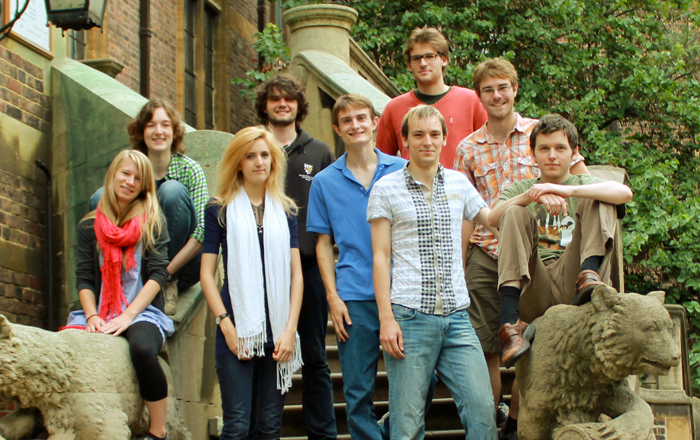Team:Cambridge
From 2010.igem.org
| Line 5: | Line 5: | ||
{{:Team:Cambridge/Templates/headerbar|colour=#386abc|title=The Project}} | {{:Team:Cambridge/Templates/headerbar|colour=#386abc|title=The Project}} | ||
| - | <html><img src="https://static.igem.org/mediawiki/2010/4/40/Cambridge-low.jpg" style="margin-left: | + | <html><img src="https://static.igem.org/mediawiki/2010/4/40/Cambridge-low.jpg" style="margin-left:4px; margin-bottom:20px; width:710px;"></html> |
We are the Cambridge Team for iGEM 2010. Over the course of the summer we have built a number of BioBricks to allow <strong>bioluminescence</strong>. We used genes originally found in fireflies (<em>Photinus pyralis</em> and <em>Luciola cruciata</em>) and those from the marine bacterium <em>Vibrio fischeri</em>. | We are the Cambridge Team for iGEM 2010. Over the course of the summer we have built a number of BioBricks to allow <strong>bioluminescence</strong>. We used genes originally found in fireflies (<em>Photinus pyralis</em> and <em>Luciola cruciata</em>) and those from the marine bacterium <em>Vibrio fischeri</em>. | ||
Revision as of 13:23, 8 October 2010

We placed genes from fireflies and bioluminescent bacteria into E.coli. Codon optimisation and single amino acid mutagenesis allowed us to generate bright light output in a range of different colours. Future applications include and quantitative biosensors and biological alternatives to conventional lighting.
If you want a break from hard-core science, check out our Gibson Assembly music video.
You can also see view videos of our bacterial bubble lamp and project overview.

We are the Cambridge Team for iGEM 2010. Over the course of the summer we have built a number of BioBricks to allow bioluminescence. We used genes originally found in fireflies (Photinus pyralis and Luciola cruciata) and those from the marine bacterium Vibrio fischeri.
These systems will form the basis of simple quantitative assays and in the future might also be used as a light source.
We have also designed a number of software tools to assist synthetic biologists, including a primer design tool for Gibson Assembly.
This page will be updated over the course of the summer as we progress through our project. If you would like to get in touch with us for any reason, please do email us.
 "
"
